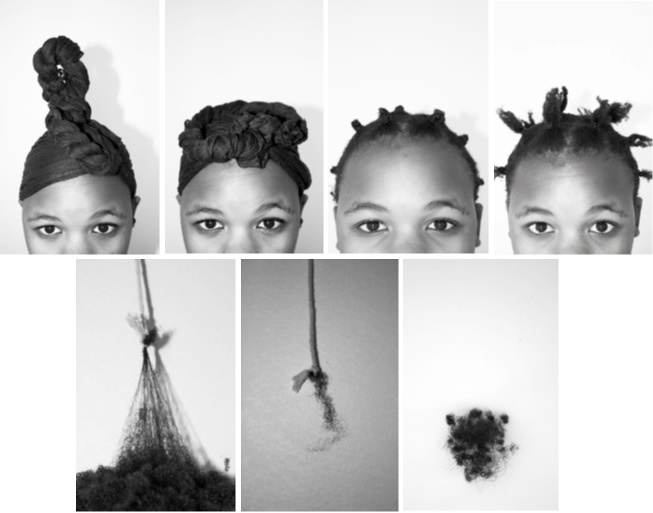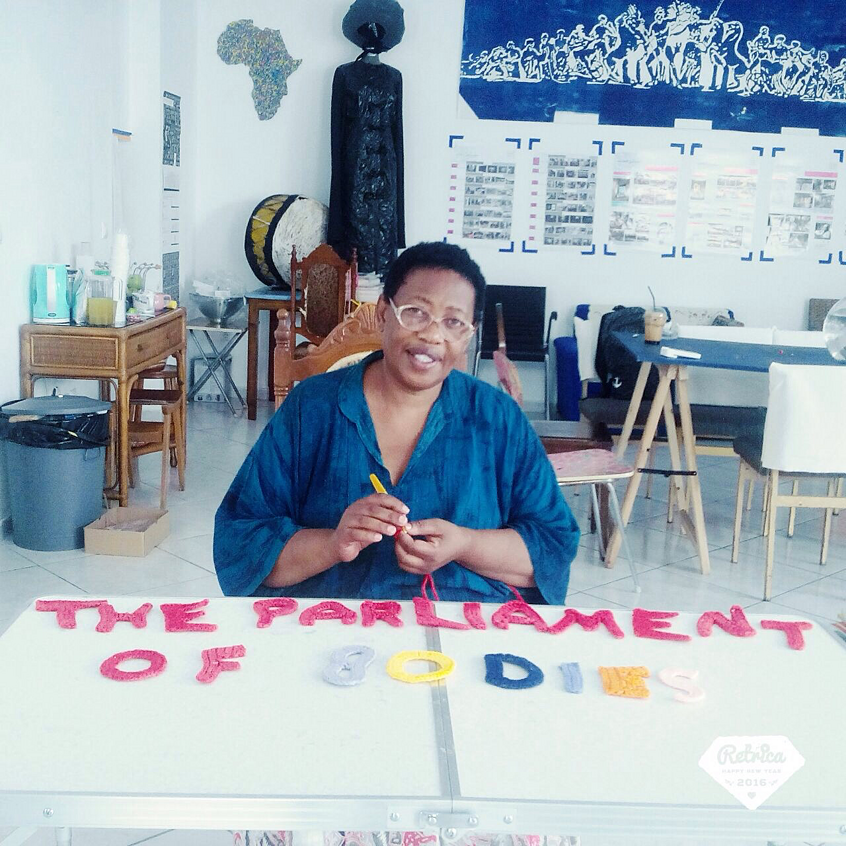
Tshiamo Naledi Letlhogonolo Pinky Mayeng, Moriri I, II, III, 2013, photographic prints
“Ke Motlhaping wa ga Molehe o mokwere. Batho ba khiba e ntsho ya ha mmaditlhong e makgantsetse. Batho ba go tshaba tshaba tlhware e bolaiwa ke basedi ka tadi e amusa sethoboloko.”
hey friend,
we never met someone whose sense of time and space moved so mysterious
so independent of the chaos of this planet
Pinky, you moved around this place completely un-warped by the constraints that distract the rest of us from the real work—the work of painfully unravelling ourselves from a system that measures us in such crude and cruel terms. Your gentle but constant refusal to take part in the brutal pace of everything meant that you let people completely share themselves with you. Your approaches in handling the motions of time and movement across space remain revolutionary—your spirit is one of the most radical, creative, patient, and kind that we will have the privilege of remembering.
With all of our love.
Tshiamo Naledi Letlhogonolo Pinky Mayeng was born on the 18th of April 1993, and she passed away quietly on the 13th of August 2017. It was easy to locate the unmistakeable nature of Pinky in everything she did, as she moved about her daily life between languages of creative resistance, whether in easy conversation, collaborative activism, her own art practice, or her wise and calm presence in her family.
Pinky matriculated at Sans Souci Girls’ High School in 2011, and continued her creative path at a design school for a year, thereafter enrolling at the Michaelis School of Fine Art in 2013. Her fierce determination to pursue her art career was never disrupted by stumbling blocks that came her way. Between 2013 and 2017 she studied and worked, having at times to take time off for full time work in order to fund her art education.
Umhlangano, the small FeesMustFall community at UCT’s Art and Drama Campus was fortunate enough to share space with Pinky during the 2016 protests, where she found the kind of love and joy that we are convinced helped move her towards the peacefulness that she radiated so firmly over the last couple of months of her life. Although having experienced many periods of difficulty and pain in the years following high school, it was so clear that her search for an embodied space in which her creative approach, spirituality, and sense of fun could cohabit comfortably yielded in recent times the most glowing, happy, and at ease Pinky we had yet known.
The body of work she leaves behind is characterized by intimate engagement with her own image and body, as a vehicle through which to consider the political weight of her and other’s positions in African society. Over the past few years, Pinky’s hair, and its various styles, became the material focal point for much of her practice. Her unstoppable experiemental curiosity drove her own image to become a constantly unravelling site of thoughtful and spiritual reflection on race and gender.
Of one of her last works, Ditoro, she recently wrote on Facebook:
Ditoro
I hold this video so close to my heart. As things unfold in my life I’ve realized how much I fortold in this performance.
Pieces of me remain in Ditoro II, a story is left behind. Gape ka moriri. I’ve never been this vulnerable in my work…
Botaki. Art. Creating. Expressing. Is so therapeutic. One thing I am so grateful still remains. Through art I remain myself.
Kelobogile.
It is this sense of self-knowledge which characterizes Pinky, from her five-year-old self, whom her father recalls absorbed in reading the newspaper, and with interest in music, poetry, and writing. She moved through life, relating to and charming people from all corners and backgrounds. While she described a slight reservedness about her character, she never failed to open herself up for honest, hilarious conversations, and was quite possibly the least judgmental person any of us have ever met.
When Pinky fell into the same comfort that she readily offered to anyone she encountered, she moved slow and with ease, touching everyone with her contagious “Mayeng” effect, that reached its height on the dancefloor. iQhiya remembers Pinky’s openness, her support as a friend and co-conspirator, her curious creative urges, and her absolute litness, and ability to launch anyone. It is going to be hard for us to dance without Mayeng. It is going to be hard to be two hours into a meeting, and miss the huge smile accompanied by
“sorry I’m late guys. I’ll catch up,”
before squishing herself in between two of us amongst the mutters of “ayy Mayeng,” and multiple head shakes and supressed laughter.
I think Pinky knew all of everyone’s secrets, our most precious ideas and tentative wild dreams because wherever she was, sharing was in practice, whether on the dance floor, in our studios, at workshops, or late night sleepy chats. I am convinced that we will continue to find you moving against popular conceptions of order and being lead by learning and love.
Our hearts are broken for what we have lost in you as a friend and a healer in our art community. We had the pleasure of sharing Cape Town with you for your last few years, and our thoughts and prayers are with your mother, father, brother, sister, and much-loved family members you leave behind, so soon after the passing of your grandmother.
—iQhiya

